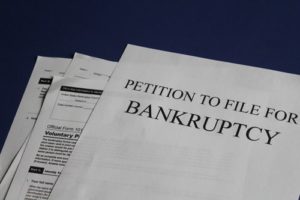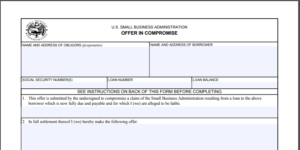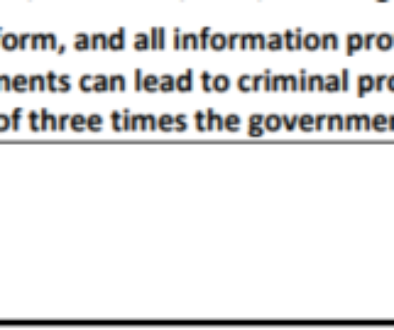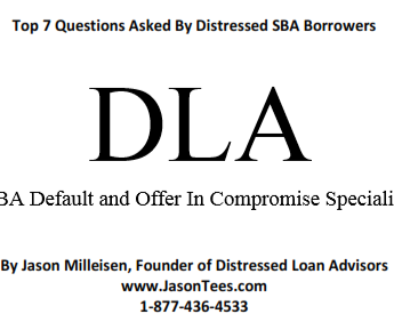When dealing with SBA loan default, small business owners often need time to mull over their options. It’s not uncommon for me to speak with a potential client several times over the course of several weeks. And that’s totally fine. I get it. Dealing with the closure of a business is rough. After losing your entire investment in the business, now the bank has it’s hand out. And you have no idea how much to offer.
This morning, I spoke with a very nice gentleman. It was not our first conversation. We had previously covered the entirety of his situation. Today, he said he had some additional questions, so I called him. Pretty quickly, it became apparent that he didn’t have specific questions about the SBA loan default process. He is just unsure if he should file for personal bankruptcy or submit an SBA Offer In Compromise (via SBA Form 1150).
SBA OIC vs. Bankruptcy
VS
In my discussion with this nice gentleman, he told me he had already spoke with a bankruptcy attorney but remained confused. I explained that I could not give any advice with regards to the mechanics of bankruptcy. But I had some questions that could help him make a decision.
Are you looking for the absolute cheapest way to resolve the situation?
If so, you should be gathering as much information as possible about every cost involved. This will involve a consultation with a bankruptcy attorney and an SBA loan default expert. You need to understand:
- Do you even qualify for bankruptcy?
- If you do qualify for bankruptcy, which type do you qualify for?
- What do you get to keep, and what do you need to give up? And how much are those assets worth?
- How much will the bankruptcy attorney charge for their services?
- If you have to negotiate repayment plans with some or all of your creditors, how much will the monthly payments be, and for how long?
- Do you qualify for an SBA Offer In Compromise?
- How much will an SBA settlement cost you?
- How much will an SBA Loan Default expert charge you for their services?
Keep in mind that in most cases, the costs associated with an SBA Offer In Compromise won’t be 100% predictable. As I frequently tell clients, the amount you will be able to settle for will depend on many factors:
- Did you pledge your home? Does it have equity in it?
- Do you have cash savings?
- Do you have a source of income once the business closes?
- How old are you?
- What’s your profession and earnings history?
- Do you have any major assets that can easily be converted to cash?
- Have you fully cooperated with the liquidation, and not done something shady or fraudulent?
What if cost is not the main factor?

For a large portion of my clients, it’s not just about getting out of the situation for as little cash as possible. Instead, they truly want to repay their debt to the extent their finances allow. And guess what? If you are willing to make a reasonable offer that’s truly in line with your ability to pay, SBA loan default can often be resolved outside of bankruptcy.
All good info, but what are the pros and cons?

- Credit Impact – You can potentially settle without having your credit impacted. To be clear, some banks do report to credit agencies about your SBA loan default, and the SBA has started to. Others don’t. If you file for personal bankruptcy, it will definitely be on your credit.
- Ability To Get Another SBA Loan – In either case, you won’t be able to get another SBA loan. Fool them once, shame on you. Fool them twice….well, I don’t know where I was going with that. They won’t give you a second SBA loan if you fail to repay the first one in full.
- Cost – Depends on your situation, so you need to do your homework on all the costs that would be incurred based on your personal situation. In other words, the cost of each will be highly dependent on your personal finances.
- Ability to Borrow In General – A personal bankruptcy will definitely be on your credit. A successful Offer In compromise may not necessarily impact your credit. So for things like credit cards, mortgages, and car loans, a bankruptcy will definitely impact those things. A settlement may have no impact at all, since it often doesn’t show up on credit.
Awesome article. Now, what should I do?
First, do your homework. This is a big decision that you should walk into with your eyes wide open. This is not the time to make a rash decision just to get it over with. Understand your options, and the corresponding pros and cons.
Second, here is the suggestion I make to people who are struggling to make a decision. If you do qualify for bankruptcy, you can always decide how much you’d be willing to pay to settle, then give the Offer In Compromise a shot. Said another way, keep the bankruptcy in your back pocket. If the bank is unwilling to settle on terms that work for you, the bankruptcy can be “plan B”.
Looking for a comprehensive guide to SBA Offer In Compromise? Check out my Definitive Guide To SBA Loan Default and Offer In Compromise.




